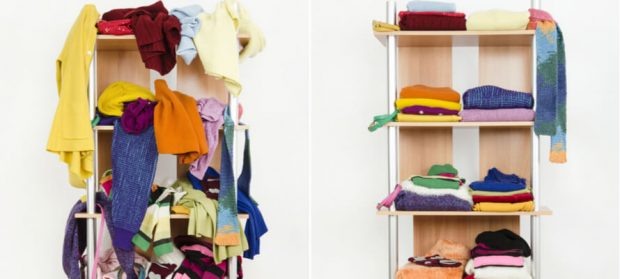
no way around it: the very thought of decluttering can make anyone groan. And, for those who have anxiety, the idea can be particularly overwhelming.
But, postponing or flat-out refusing to deal with clutter inside a home can be just as bad; not addressing the mess leads to a vicious circle that feeds on the fear of losing control and also triggers sensory overstimulation. So, what can you do to break this toxic cycle and reclaim control over the smaller aspects of life? The answer is as simple as it is scary: clean up.
Find a balance
Start by not thinking of it as a chore—which is easier said than done. Instead, think of it as a way to keep anxiety at bay.
Also, give yourself time to adjust to the idea of having to declutter, Rome wasn’t built in a day and neither should your routine. This doesn’t have to turn into an episode of stress-cleaning in order to get the results your mind craves. Reducing the mess can be just as effective as getting rid of it altogether. Start small with a busy corner. Work your way up to one side of the room, then the entire room. Don’t shy away from breaks, and don’t kick yourself if they go a bit too long. The point is to make this an enjoyable experience that will benefit you in the long run.
Out of sight, out of mind
It is widely considered that a disorderly living space mirrors the state of mind of a person—and that spending time in such an environment can aggravate anxiety issues. However, the things you need to get rid of aren’t necessarily junk; you may have personal items that carry emotional significance. A more minimalistic way of life could be the answer if you feel as though your space is taken over by stuff. Set aside some time to sort through your belongings and decide what to keep and what needs to find another home. This is a particularly good approach if you’re looking to rent and worry that the volume of belongings might weigh you down.
Ask for help
If you don’t know where to start, you’re not alone, many people find themselves in similar situations. A professional organizer sounds great but could dig a hole in your budget. At the end of the day, there’s no one better to ask for help than someone who knows you. Pick someone in your family or a friend who knows what you’re going through. Even if they’re not the tidiest person you know, their presence can ground you and give you the motivation you need to keep going.
If you don’t want to share your struggle with anyone in your life, the internet is also a great resource. Research the best tools and read about others who are also working to keep things under control, hearing other people’s stories might help put your mind at ease and give you a clearer idea of where to start your own routine.
Keep it going
Getting started is the hardest part. Now that you can see the benefits of a decluttered lifestyle, it’s important to incorporate it into your daily life.
Don’t wait until the house needs a good cleaning and that overwhelming feeling creeps up on you once more. Make cleaning up after yourself a routine by starting small: put the dishes away after a meal, and don’t throw your clothes around the room at the end of the day. These small habits can make a huge difference in your overall well-being. Whether it’s five minutes every day or half a day every week, take a good look at your surroundings and do everything within your power to make it a better place all around.
Daily responsibilities can be overwhelming and make you lose track of what’s most important: your mental health. Whether you’re dealing with anxiety or feeling stressed, give decluttering a chance, as it is key to changing the overall feeling of a space and it can greatly improve one’s mood. The place you live in often reflects what’s inside your head and getting it in order can take time. Be patient with the process and with yourself.
Author bio:
Alexandra Ciuntu is a creative writer and researcher for RENTCafé. With a background in e-learning content writing and a passion for knowledge-sharing platforms, she now enjoys researching and writing about the renting lifestyle, renter demographic shifts, and residential real estate market trends and news.









![Daily Bite [Make]: Philly Cheesesteak Stuffed Bell Peppers](https://dashofwellness.com/wp-content/uploads/2013/01/Philly-Cheesesteak-Stuffed-Pepper-Daily-Bite-1-100x70.png)
